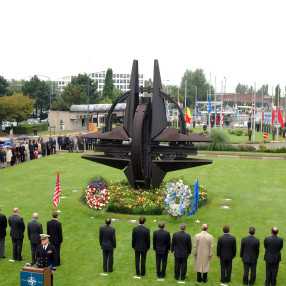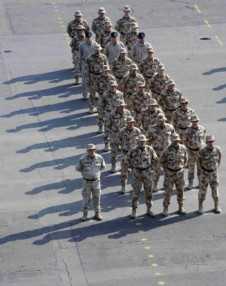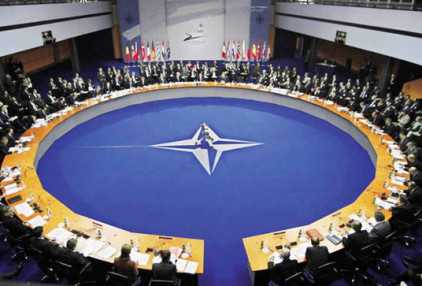Imre Szekeres: NATO’s sixtieth anniversary
Szöveg: Imre Szekeres | 2009. március 31. 10:06The viability of an international organization can be ideally appreciated if it survives the elimination of the grounds of its own creation. Celebrating its sixtieth anniversary on April 4th, NATO – an alliance in which Hungary has been a member for a decade, since March 12 1999 – has already proven its capabilities.
Although its integrating power and problem-solving capability seems to be on the verge of exhaustion sometimes, but I am certain that with novel solutions, further enlargement and the improvement of interrelationships between partner countries, we will be able to render NATO indispensable in the world political arena.
Diplomacy is an art of restraining power. The last Republican administration was a government which had the greatest tendency to forget this bon mot of Henry Kissinger, the legendary Secretary of State of the Republican president, Richard Nixon. The results are well-known: a debate has unfolded between Europe and America about the future and objectives of NATO. Especially the relationship between Germany and American as well as France of Germany, respectively were to suffer from such exchange of words. However, this difference of opinion has subsided and then completely disappeared in the last years, partly because new politicians have entered the stage, replacing those giving rise to the original difference. The French President Nicolas Sarkozy, the British Prime Minister Gordon Brown, the German Chancellor Angela Merkel have a visibly different way of thinking regarding the role of Europe, the relationship between Europe and America than their predecessors. And by the inauguration of Barack Obama, a change of political views has occurred on the American side, as well.

Of course, all these statements do not necessarily mean that from now on, we will support every American initiative without due criticism. The USA cannot expect either that Europe should forgo its own vision in security policy or that NATO member states should get rid of their own national interests. We have to return to NATO’s original goal, to provide a collective guarantee to the security of member states. At present, the real threat is not posed by the Soviet Union anymore, but by organized crime, climate change, the insecurity of energy supply, natural disasters, terrorism, cyber-attacks. And the renewed multipolarity of the world is not a threat anymore, but a reality, namely that new powers in terms of economy, energy and later on, military might are emerging which we have to take in account. Our elemental interest is a stronger NATO, which is capable to guarantee more security for its members, even if in a world economic crisis, most countries turn inward at first and while not sensing any direct military threat, they are trying to mitigate the damage from their defense budgets.
One pole of the new world order, which is becoming newly pronounced (or maybe, reflected from the past) is Russia, the largest successor state of the Soviet Union. Its size, political weight, atomic arsenal alone justify the country’s power. For Europe, it is especially important as the greatest energy explorer of our continent, but the country is an indispensable political participant in the Central Asian region, as well. We have to make it clear to Russia that it may not have a right to veto NATO’s enlargement. Every country has an unalienable right to choose the alliance to which it intends to belong. Russia must respect the principle of territorial integrity and sovereignty. At the same time, we have to accept that the security and sense of safety in the Euro-Atlantic region greatly depends on relationships with Russia.
This is not because Russia represents a military threat but because lack of cooperation makes the management of acute global crises critical. A good example for this is Afghanistan or Iran where joint action would obviously be more efficient. For NATO, it is of key importance that Russia provide to the alliance the transit route and logistical background for key troop operations, especially in Afghanistan. But Russia can also be an important partner in the fight against terrorism and drug smuggling, as well as in cooperation regarding arms control or in the joint action against piracy which represents an ever-increasing danger to international waters. Barack Obama, when receiving the outgoing NATO Secretary of General, Jaap de Hoop, also emphasized the importance of improving the relationship with Russia, at its press conference at the White House. Fortunately, our country is maintaining good relationships with Moscow, thus Hungary could be one of the catalysts of this rapprochement process. This is also indicated by the fact that a Hungarian general is serving as a liaison between the Russian government and NATO in the alliance’s Moscow office.
Reinforcement of partnership can be initiated first in the area of mutual exchange of experiences and the cause of Afghanistan. Not even Russia could be interested in deepening the conflict. However, if acting together, we can try to achieve a purpose not achieved separately by either NATO or the Soviet Union which had kept Afghanistan occupied for a decade: pacification of the country. Another warning of Kissinger has become true before our eyes: traditional armies lose if they cannot win, however terrorists also win if they have not lost. We must not get that far!. Of course, we were aware of the fact that the era of traditional warfare was over but NATO (and the armies of some of its member states) did not change course at a suitably fast pace. We really have to prepare for conflicts far away from American and European borders and not the least, we have to believe and make others believe that we are protecting our own interests even far away from our countries.
Of course, the solution by the use of weapons can only be the first step towards normalization. Fortunately, NATO is a powerful instrument for the second step, as well, since it is not only a military organization, but a political alliance, as well. The second step must be represented by the political solution, this was confirmed by the President of the United States, as well last Friday, when he announced the new Afghanistan Strategy of the USA. It is important to find or reinforce the common tone with local interest groups, warlords and ethnic groups in Afghanistan. We should set a realistic goal: we cannot wish to establish an exemplary Western-type state, but we should intend to help the establishment of a viable country under the local circumstances. In Afghanistan, the Afghan government and the Afghan people are those who can do the most to facilitate normalization, on the other hand, the international community has to render the most efficient assistance to these efforts.
Normalization of Afghanistan is primarily not a military task. An equal if not greater emphasis should be placed on the establishment of a state system and economy functioning at an adequate level. The creation of normal, everyday living conditions, as well as the development of infrastructure should be an integral part of the international community’s efforts. “Afghanization" , creation of “local ownership" is of key importance. An Afghan solution is needed in Afghanistan. In the same way, the importance of a regional approach, “regional ownership" should be anticipated. No Afghan solution can be found without solving Pakistan’s problem. A progress is needed in the relationship of the latter two countries (Afghanistan and Pakistan), as well. But even other surrounding countries can have an effect on the whole region. India, Iran and China must be involved in the solution.

The presence of the Hungarian Defense Forces in Afghanistan is in the interest of Hungary as an allied country, and as such, it is our indirect national interest whereas peace in the Balkans is a direct national interest of our country. As I can state without exaggeration, we are specialists in the field of peacekeeping in the Balkan region not just because we have been participating in the process for one and a half decades but due to the fact that we have been living together with Balkan people for centuries, we know and understand them. Of course, it was not just by chance that the Hungarian embassy provided a liaison mission during Croatia’s NATO preparation and the Hungarian diplomatic mission will be able to fulfill the same role in the case of Montenegro very soon. We are one of the chief advocates of the normalization process in the countries in the region, and we are inside NATO, thus we will have to take on this role in the future, as well. Even if the crisis reinforces isolation in the Balkan region, as well instead of cooperation which has nevertheless started, despite initial setbacks.
Member states can only solve the problems looming before the alliance if they spend their defense budgets more prudently than the usual patterns in the past. We have to find those solutions which make possible the more rational and efficient use of resources. The cooperation for the creation of a strategic airlift capacity is exemplary, in which not only NATO countries are participating. The transportation aircrafts deployed to Pápa are solving a decade of hiatus, from a fraction of the amount which project-financing countries would incur if creating this capability independently.
During the development of capabilities, we have to consider that the protection of our countries’ territorial integrity and sovereignty and participation in expeditionary operation are not contradictory demands. Furthermore, on the basis of proportional burden-sharing, everyone has to contribute to the relief of common burden instead of just enjoying the advantages of collective defense.
However, the development of capabilities is just one task faced by us. Equally important is the regulation of the relationship between NATO and the European Union. It is a luxury in the western world that the relationship between the two dominant organizations is beset by long-term problems. Thus, a strategic improvement of the relationship between NATO and EU is of paramount importance. One possibility for this is harmonization of strategies: we have to strive for the formation of a joint transatlantic worldview. However, it is certain that in order to solve this problem, we have to touch upon long-standing political conflicts even in the alliance: sooner or later, the conflict between Greece and Turkey, which has intensified on account of Cyprus and is still going on at various levels of intensity, or the unclear relationship between Turkey and the EU should be included in the common agenda since without solving these, the relationship between NATO and the EU cannot be normalized in an adequate and long-term manner, either.

Apart from a pressing necessity, crises also represent a new chance both in the economic and the political field. A chance for a new worldview, for the creation of a more economical but more efficient security. For the establishment of a more active and stronger NATO, guaranteeing more security for all of us. The task to be performed is difficult, it may even seem impossible at times. But as an encouragement, we can still return to Henry Kissinger, who said that all recognized foreign policy strategies in history have come from leaders whose respective plans were regularly opposed by the relevant experts.
Imre Szekeres
Guest commentary: The Iron Curtain – Has It Been Completely Demolished?